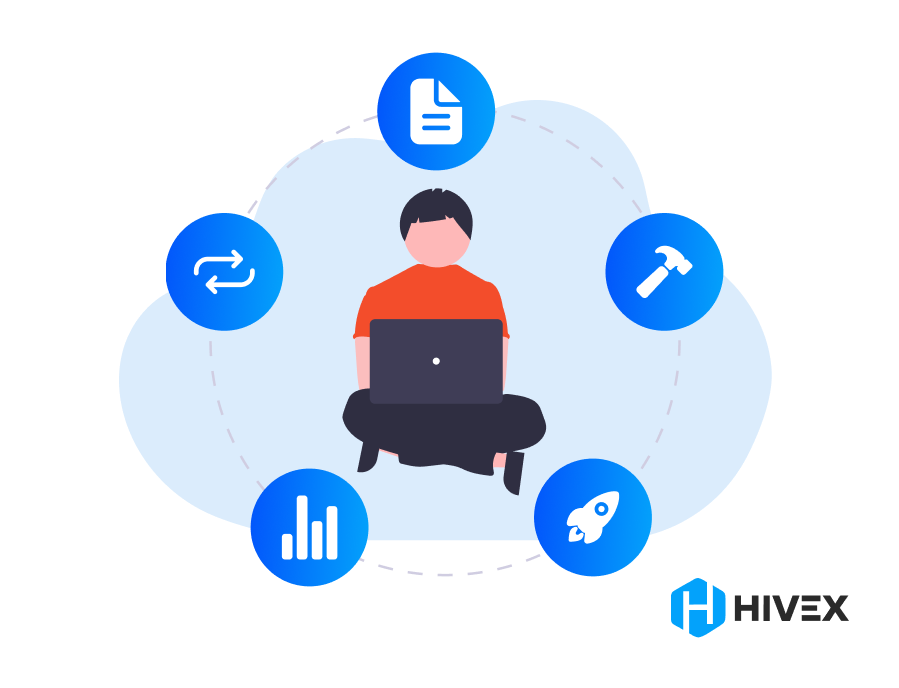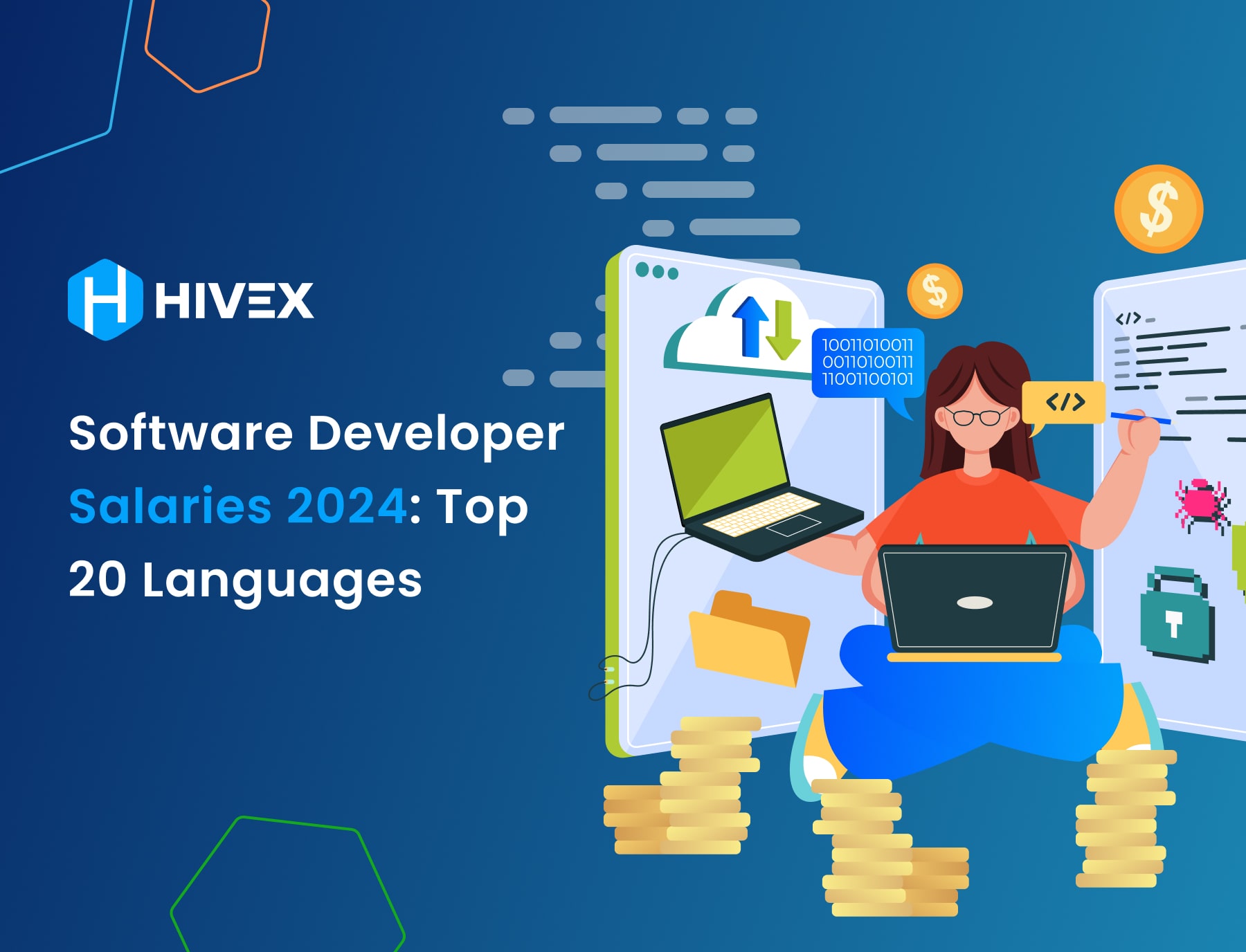How to hire developers for a startup in 2024

Throughout this article, you will learn how to hire a software developer for your startup.
Let’s admit it – hiring skilled and talented professionals is crucial for the success of your business. If you are lucky enough to hire the top ones, you can shape your product, drive innovation, and create an environment conducive to teamwork.
Despite that, finding and hiring a vet software developer can be a challenge because of the ever-increasing demand for technical talent.
Understanding the Role of a Software Developer in a Startup
Before diving into the hiring process, it is essential to understand the role a software developer plays in a startup.
Software developers write, test, and maintain the code that powers the startup’s product. As part of their role as software developers, they work closely with other team members like designers, product managers, and project managers to translate ideas and requirements into functional software solutions.

When it comes to writing clean and efficient code, a software developer needs to have a deep understanding of programming languages such as JavaScript, Python, or Java. They should be well-versed in the best practices and coding standards of these languages to ensure that the code they write is not only functional but also maintainable and scalable.
Collaboration is another crucial aspect of a software developer’s role in a startup. They need to work closely with cross-functional teams to understand the requirements and expectations of the product.
This collaboration involves effective communication and active participation in meetings and discussions. By collaborating with designers, software developers can ensure that the user interface and user experience of the product align with the overall vision and goals of the startup.
Participating in code reviews and debugging is an integral part of a software developer’s responsibilities. Code reviews help identify and fix any potential issues or bugs in the codebase, ensuring that the software runs smoothly. By actively participating in code reviews, software developers can learn from their peers and improve their coding skills.
In addition to writing new code, software developers also play a vital role in maintaining and updating existing software. This involves fixing bugs, implementing new features, and optimizing the performance of the software. By continuously improving the existing codebase, software developers contribute to the overall growth and success of the startup.
When it comes to hiring a software developer for your startup, there are certain skills and qualifications that you should look for. Proficiency in programming languages is a must, but it’s also essential to consider their experience with software development frameworks and tools. These frameworks and tools can significantly impact the efficiency and productivity of a software developer.
Strong problem-solving and analytical skills are also crucial for a software developer. They need to be able to identify and solve complex technical problems efficiently. This requires a combination of logical thinking, attention to detail, and the ability to think outside the box.
Lastly, excellent communication and teamwork skills are essential for a software developer in a startup environment. They need to be able to effectively communicate their ideas and collaborate with team members from different backgrounds and disciplines. By fostering a positive and collaborative work environment, the software engineers and developers can contribute to the overall success of the startup.
The Importance of Hiring the Right Software Developer

The impact of hiring the right software developer for your startup cannot be overstated. They will not only shape the development of your product but also influence the overall team dynamics. Here are two key aspects of hiring the right software developer:
Impact on Product Development
A talented software developer can drive innovation and efficiencies within your product development process. They bring fresh perspectives, technical expertise, and creativity to the table, which can result in better products and improved user experiences. With their deep understanding of coding languages and frameworks, good developers show they can develop robust and scalable solutions that meet the needs of your target audience.
Moreover, a skilled developer can help you navigate technical challenges that arise during the development process. They possess problem-solving skills and the ability to think critically, allowing them to identify and address potential roadblocks efficiently. By optimizing code performance and ensuring scalability, they lay a solid foundation for your startup development company’s growth and success.
Additionally, the right software developer can contribute to the overall design and architecture of your product. They can collaborate with designers and user experience experts to create intuitive interfaces and seamless interactions. Their attention to detail and understanding of user behavior can result in a product that not only meets but exceeds customer expectations.
Influence on Team Dynamics
Building a cohesive and collaborative team is essential for startup success, and the right software developer can significantly impact team dynamics. They can inspire and motivate other team members, fostering a culture of continuous learning and growth. By sharing their knowledge and expertise with remote developers, they empower their colleagues to improve their skills and contribute to the overall success of the startup.
A supportive and inclusive environment attracts top talent and encourages a diverse range of perspectives, which leads to better problem-solving and innovation. The right software developer can contribute to creating such an environment by promoting open communication, respect, and teamwork. They can act as a mentor and guide for junior developers, helping them develop their skills and achieve their full potential.
Furthermore, the right software developer can bring a sense of camaraderie to the team. They can organize team-building activities, such as hackathons or coding challenges, that foster collaboration and friendly competition. By creating a positive and engaging work environment, they contribute to higher employee satisfaction and retention.
In conclusion, hiring the right software developer is crucial for the success of your startup. They not only impact product development by driving innovation and efficiency but also influence team dynamics by inspiring and motivating their colleagues. By investing in the right talent, you set your startup on a path toward growth, success, and a competitive edge in the market.
Steps to Hiring Developers for Startup

After we have established the importance of hiring the right software developer for the startup, let’s take a look at the step-by-step process of hiring the right software developer:
Defining Your Requirements
It is important to evaluate your specific software development needs before you begin the search for candidates. Determine the skills, experience, and qualifications that are required for the position. Determine the scope of work based on your product roadmap and business objectives and determine the responsibilities and scope of the role.
For example, if you are building a mobile app, you might need a developer with experience in iOS or Android development. If you are working on a web application, you might need someone proficient in the front-end or back-end development processes. To ensure you can find developers that are a good match for your startup, it is imperative that you clearly define these requirements.
Where to Find Potential Candidates
There are various channels through which you can source potential software developer candidates. Consider leveraging:
- Online job boards and platforms, such as LinkedIn, Stack Overflow, and GitHub
- Local tech communities, events, and meetups
- Referrals from trusted industry professionals or colleagues
- Collaboration with coding boot camps and tech education institutions
By utilizing these different channels, you can tap into a diverse pool of talent. Online platforms allow you to reach a wider audience, while local tech communities and events provide opportunities for networking and direct interaction with potential candidates. Referrals from trusted sources can also be valuable, as they come with recommendations and insights into the candidate or job board’s abilities.
The Interview Process
As soon as you identify some potential candidates, it is time to interview them. The interview process should be structured so that both technical skills, as well as cultural fit, can be assessed.
As part of a technical interview, you may have to perform coding exercises, solve problems, and discuss past projects. These assessments can also help you determine a candidate’s proficiency in the relevant programming languages, frameworks, and tools. Furthermore, you can assess a candidate’s problem-solving skills as well as their approach to software development.
Cultural fit interviewers assess a candidate’s ability to align with the values, work culture, and team dynamics of your startup as part of the interview process. In addition to asking the candidate questions about their preferred work environment, their communication style, and their ability to collaborate effectively with others, these interviews may also include questions about their preferred work environment.
Even though an individual has exceptional technical skills, he or she may present challenges down the road. This is if they do not fit well in the team or do not share the startup’s vision. Interviews should be balanced between technical and cultural skills to avoid misunderstandings.
During the interview process, you should provide candidates with the opportunity to ask questions. This will provide them with a better understanding of your startup and the position they are applying for during the interview period.
Evaluating Technical Skills and Cultural Fit

Technical Skills
When it comes to evaluating candidates for a technical position, assessing their technical competency is crucial. There are several effective methods to gauge their problem-solving and coding abilities:
- Conduct coding exercises or technical assessments: By giving candidates coding exercises or technical assessments, you can evaluate their ability to solve real-world problems. This approach allows you to assess their coding skills, logical thinking, and attention to detail.
- Ask candidates to present past projects or code: Requesting candidates to showcase their past projects or code they have developed provides valuable insights into their coding style, creativity, and ability to deliver high-quality work. It also allows you to assess their ability to work on complex projects and their familiarity with industry best practices.
- Explore their knowledge of relevant technologies or frameworks: In the rapidly evolving tech industry, candidates must stay up-to-date with the latest technologies and frameworks. By exploring their knowledge in these areas, you can determine their ability to adapt and learn new technologies quickly.
Cultural Fit
While technical skills are essential, determining cultural fit within your startup is equally important. Here are some strategies to assess whether a candidate aligns with your company’s values and work environment:
- Ask behavioral questions: To gauge a candidate’s approach to teamwork, communication, and conflict resolution, asking behavioral questions is highly effective. This allows you to assess their interpersonal skills, ability to collaborate with others, and how they handle challenging situations.
- Assess adaptability and openness to learning: In a fast-paced and ever-changing industry, candidates must be adaptable and open to learning new technologies or methodologies. By assessing their willingness to embrace change and their enthusiasm for continuous learning, you can determine their potential for growth within your organization.
- Consider incorporating team-based activities: Observing how candidates interact in group settings can provide valuable insights into their teamwork and collaboration skills. By incorporating team-based activities or collaborative exercises during the evaluation process, you can assess their ability to work effectively with others and contribute to a positive team dynamic.
Expanding on the evaluation process can help ensure that you thoroughly assess candidates’ technical skills and cultural fit. By utilizing a combination of coding exercises, project presentations, knowledge exploration, behavioral questions, adaptability assessment, and team-based activities, you can make well-informed decisions when selecting the right candidates for your startup.
Onboarding Your New Talented Developers

If you have found the most qualified software developer for your startup, making sure they are onboarded effectively is the key to ensuring their success as well as the overall success of your development team. These are the key steps to ensuring a smooth transition:
Bringing on board a software developer is an exciting time for any startup. This is not only a sign of significant growth and progress, but also a sign that you have found the right developer and the right match for your team. However, hiring a software developer is not enough. A well-planned onboarding process is essential if you wish to maximize their potential and ensure seamless integration into your team.
Setting Expectations and Goals
Define the role, responsibilities, and objectives of the software developer clearly, and determine your expectations of their performance, time management, and deliverables. Set realistic goals and milestones, ensuring they align with the overall vision for the startup as a whole.
When the new software developer is onboarding, it is important to sit down with him/her and talk openly about what is expected of them and what is expected of them during that period. As a result of setting clear expectations from the beginning, you are laying the foundation for a successful working relationship. It will not only help them understand their role better but will also allow them to ask any questions they may have.
Integrating into the Team
Facilitate introductions and encourage interactions with other team members. Foster an inclusive and supportive environment where collaboration and knowledge-sharing are valued. Assign a mentor or buddy to help the new software developer navigate the startup’s culture, processes, and tools.
Joining the team can be intimidating, especially for a software developer who is expected to hit the ground running. To ease this transition, it is crucial to create an environment that promotes teamwork and collaboration. Encourage team members to introduce themselves and make the new developer feel welcome. By fostering a sense of belonging, you help the newly hired team member feel more comfortable. You are also fostering a positive and productive work culture.
Assigning a mentor or buddy to the newly hired software developer can also be beneficial. This person can act as a guide, helping the new team member navigate the startup’s unique culture, processes, and tools. They can provide insights, answer questions, and offer support, ultimately helping the new developer feel more confident and integrated into the team.
Future Trends in Hiring Software Developers

As the technology landscape continues to evolve rapidly, it’s important to stay updated on the latest trends in software development hiring. Here are a few emerging trends to consider:
Emerging Skills and Technologies
Stay abreast of emerging programming languages, frameworks, and tools to ensure you attract talented developers, with the right skills. In today’s fast-paced digital world, it’s crucial to keep up with the latest advancements in software development. For example, artificial intelligence (AI) is revolutionizing various industries, including software development. AI-powered tools and frameworks are being developed to automate repetitive tasks, optimize code, and enhance the overall development process.
Furthermore, machine learning is another trend that is transforming the software development industry. Machine learning algorithms enable software applications to learn from data and improve their performance over time. Developers with expertise in machine learning can help organizations build intelligent applications that can analyze large datasets, make predictions, and provide personalized experiences to users.
In addition to AI and machine learning, blockchain technology is gaining traction in the software development field. Blockchain, originally known for its association with cryptocurrencies like Bitcoin, has expanded its applications to various industries. It offers decentralized and secure data storage, smart contract capabilities, and transparent transaction records. Developers skilled in blockchain can help organizations implement innovative solutions, such as supply chain management systems, digital identity verification, and secure financial transactions.
Lastly, cloud computing has become an essential component of modern software development. Cloud platforms provide scalable infrastructure, storage, and computing power, allowing developers to build and deploy applications more efficiently. Familiarity with cloud technologies, such as Amazon Web Services (AWS) or Microsoft Azure, is increasingly sought after by organizations looking to optimize their software development processes.
Changing Hiring Practices
The hiring landscape is continually evolving, and it’s important to adapt to changing practices. Remote work and flexible scheduling are becoming more prevalent, providing opportunities to tap into global talent pools. With the advancements in communication technology, teams can collaborate effectively regardless of their physical location. Embracing remote work can help organizations access a diverse talent pool, foster innovation, and reduce overhead costs associated with hiring developers maintaining physical office spaces.
Moreover, traditional hiring methods are being complemented by alternative approaches that focus on assessing candidates’ skills and abilities. Skill-based assessments, such as coding challenges or technical interviews, provide a more accurate evaluation of a candidate’s capabilities compared to traditional resumes and interviews. These assessments allow employers to gauge a candidate’s problem-solving skills, technical proficiency, and ability to work in a team.
Another innovative hiring practice gaining popularity is the use of hackathons. Hackathons are events where developers come together to collaborate and solve real-world problems within a limited timeframe. Organizations can host hackathons to identify top performers and assess their creativity, teamwork, and ability to deliver under pressure. Hackathons not only serve as a recruitment tool but also provide an opportunity for developers to showcase their skills and network with industry professionals.
In conclusion, staying informed about emerging skills and technologies in software development is crucial for attracting top talent. Additionally, adapting to changing hiring practices, such as remote work and alternative assessment methods, can help organizations build diverse and high-performing development teams.
Conclusion
Hiring a software developer for your startup in 2024 requires careful planning, effective sourcing, and a thorough evaluation process. By understanding the role of a software developer, recognizing the importance of finding the right fit, and following the outlined steps, you can hire a talented software developer who will contribute to your startup’s success.
Embrace the future trends in software development hiring, remain adaptable, and continuously invest in fostering a collaborative and innovative team culture. The right software developer is out there, waiting to join your startup and help shape the technology landscape of tomorrow.


